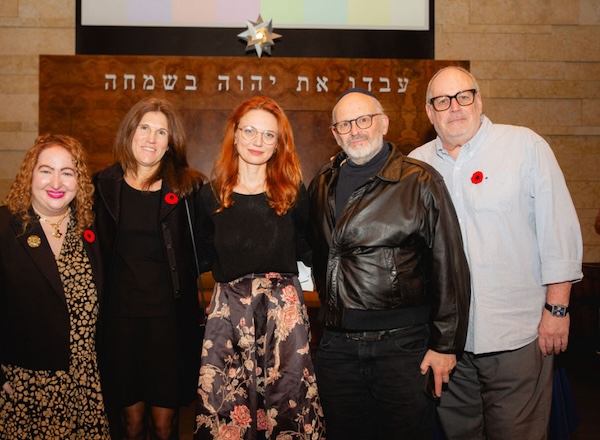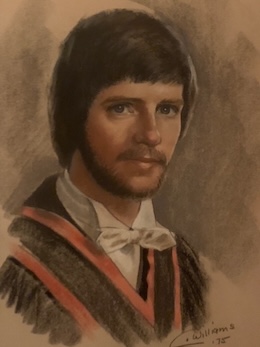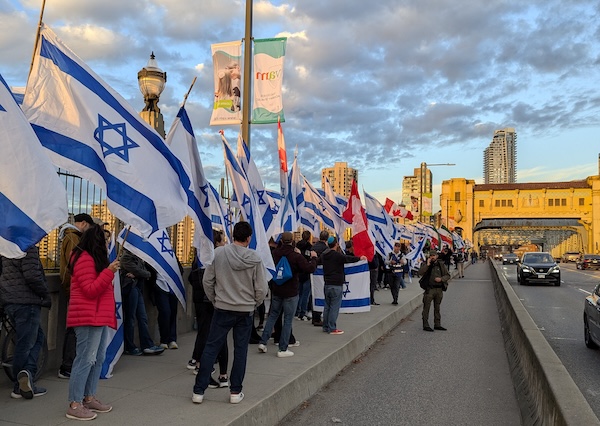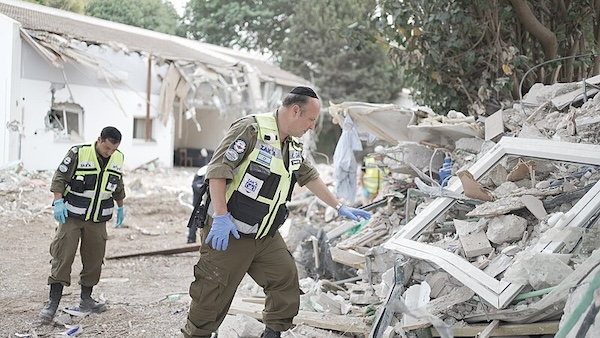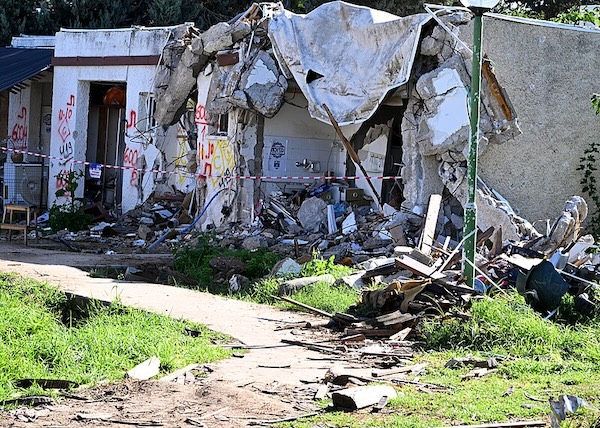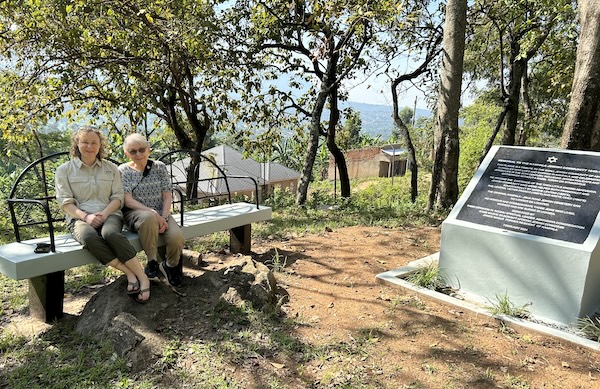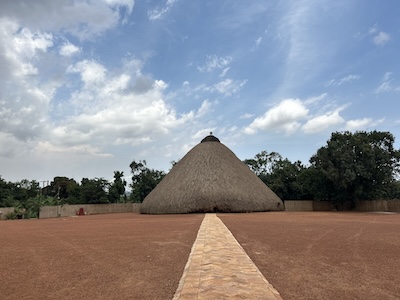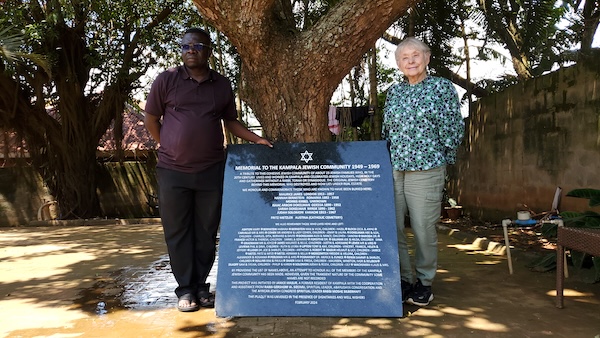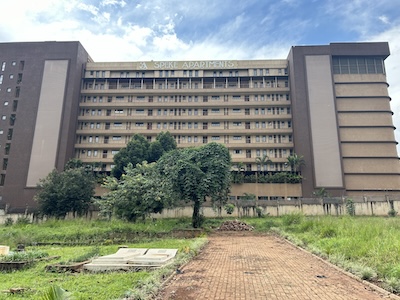Geoffrey Druker leads the Vancouver Yom Hazikaron ceremony at Temple Sholom on April 29. (photo by Pat Johnson)
On the morning of Oct. 7, Sgt. Tomer Nagar started his guard duty at 6 a.m. on the Israel Defence Forces base at Kibbutz Kissufim, near the Gaza border.
He was alone with his weapon and the standard 675 rounds of ammunition. Half an hour into his shift, the base was hit by massive mortar fire, then swarmed by Hamas terrorists. The surveillance soldier who was monitoring the border told Nagar to retreat because he was massively outnumbered.
Nagar chose to ignore the instructions and remain at his post, intending to prevent or delay the terrorists’ entry into the base, to give his colleagues time to prepare and to fight for their lives. The battle went on for hours.
“The Kissufim base did not fall into the hands of Hamas,” said Geoffrey Druker, as he began the annual Vancouver ceremony marking Yom Hazikaron, the day of remembrance for the fallen of Israel’s wars and all victims of terror, April 29, at Temple Sholom. “But 13 Golani solders and three from the Egoz unit were killed. When they finally reached Tomer Nagar, they found his body. Around him lay 675 empty bullet casings. He fought ’til his last bullet. He was 21 years old.”
Members of the British Columbia Jewish community lit candles in memory of loved ones, family and friends who have died during the 77 years of Israel’s existence as a state. The day of remembrance closed the following night at Congregation Beth Israel, prior to Yom Ha’atzmaut, Israel Independence Day, celebrations.
Druker, who for many years has led the local commemoration, highlighted instances in which fighters risked and often lost their own lives to prevent the advance of terrorists, thereby saving countless lives.
There were 31 police officers securing the 3,500 or so attendees at the Nova music festival. Equipped mostly with handguns, the officers held off as many infiltrators as possible. In the process, 16 of the 31 were killed, as were another five officers from teams that arrived as reinforcements.
“Their battle helped prevent the terrorists from penetrating deeper into Israel and attacking other communities,” said Druker.
Nearby, in the city of Sderot, the police station was attacked by Hamas terrorists in white pickup trucks, armed with anti-tank rockets. Seven police officers raced to the roof of the station to fight off dozens of attackers. With limited ammunition, they held out for nine hours. A special rescue unit managed to reach the scene and save most of the officers, but Mor Shakuri, one of two police on site that day, was killed. She was 28.
Inbar Heyman was a world-renowned graffiti artist, whose works can be seen throughout Tel Aviv under the name Pink. She attended the Nova festival to provide emotional support to the attendees.
“When the attack started, she hid, and then tried to flee,” Druker said. “Around 1 p.m., she was caught and could be seen taken on a motorcycle into Gaza. Her family waited in fear to hear her fate – 71 days they waited until they were told she was murdered in captivity. She was 27 years old.”
Inbal Binder and Raz Shifer, friends of Heyman who were with her at the festival, were in Vancouver. They lit a candle in her memory and read Yizkor.
At the IDF base at Nahal Oz, 54 soldiers were killed after the kibbutz was overtaken by Hamas on Oct. 7. These included 15 tatzpitaniyot, female surveillance soldiers. Another seven tatzpitaniyot were taken hostage in Gaza.
“One was later rescued by the IDF,” said Druker, “and one, Noa Matziano, was murdered at the Shifa hospital in Gaza. It took 482 days until the final tatzpitaniyot returned home in January this year.”
Among those killed at Nahal Oz on Oct. 7 was Roni Eshel, the eldest daughter of Eyal and Sharon Eshel’s three children.
“She would typically end her text messages to her family, signing off with five emoji hearts, one for each family member,” Druker said. “On the morning of Oct. 7, when attacked, she was texting her parents. It was the last morning of her life. She ended her message with four hearts. Later, her father Eyal said, ‘I should have realized then what she was telling us.’”
Ruthie Mizrahi, a Vancouverite who is a childhood friend of Eyal Eshel, lit three candles at the ceremony – one for Roni Eshel, one for Rotem Dushi, whose father Yaron was an army friend of Mizrahi, and one for her uncle, Oded Lifshitz, a founder of Kibbutz Nir Oz, whose family had to wait 503 days to hear that his body had been identified.
Kfar Aza was the first kibbutz Hamas conquered on Oct 7. An estimated 250 terrorists entered the kibbutz, murdering 64 residents and taking 19 hostage.
Vancouverite Micha’el Richenshtein’s father, Eliyahu (Aliko) Reichenstein, was among those murdered. Richenshtein lit a candle in memory of her father and all who were murdered on Kibbutz Kfar Aza.
More than 300 terrorists invaded Kibbutz Be’eri, where they murdered 102 people and took 32 civilians hostage. Among the hostages was Carmel Gat, who was later found executed with five others, murdered as the IDF advanced on their location in Gaza. Lynn Adam Saffery, a British Columbian who is a member of Gat’s extended family, lit a candle of remembrance.
Mushon Mizrachi recited kaddish for his nephew, Ben Mizrachi, the Vancouver-raised IDF medic who died a hero saving others at the Nova festival.
Other fallen were also commemorated.
Dany Guincher made aliyah with his family from Chile and, in 1967, joined the IDF, became a tank crew member, a commander and then an officer.
“On the sixth of October 1973 – Yom Kippur – Egypt and Syria tacked Israel,” said Druker. Guincher was then studying at university in Pennsylvania, but he managed to find a flight back to Israel.
“He was greeted at the Ben Gurion Airport by his brother, Lito,” Druker said. “Dany joined the forces in the Sinai and led his tanks into battle in the city of Ismailia. On the 23rd of October 1973, his tank was hit and Dany Guincher was killed.”
Lito, who was a member of the Vancouver community, has since passed away, but his son-in-law, Jack Micner, who is married to Dany’s niece Karen, lit a candle in Guincher’s memory and read Yizkor.
Also present was Zev Tanne who, with his 17- and 18-year-old classmates of Mikveh Israel agricultural school, fought in the 1948 War of Independence as part of the elite Palmach unit of the Haganah. He survived a battle in which 11 of his classmates were killed.
Lihi Shushan and Or Shukrun, shinshiniyot (teen emissaries), honoured fallen soldiers and civilian casualties from Vancouver’s partnership region in the Upper Galil.
Ruchot Hatzafon, headliners of the following evening’s Yom Ha’atzmaut celebration, performed.
Druker thanked the Jewish Federation of Greater Vancouver for supporting and Temple Sholom for hosting the event, as well as the musicians who performed.
Israel’s deputy consul general for Toronto and Western Canada, Shani Azulai, addressed the event in a recorded video message.
Rabbi Eliahu Barzilai of Congregation Beth Hamidrash recited El Moleh Rachmim.


